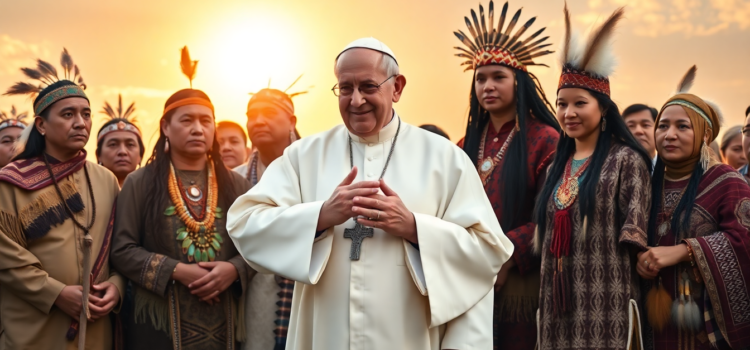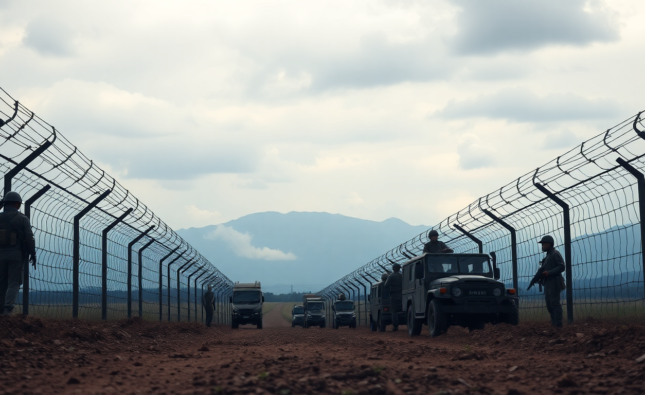
Pope Francis’s Legacy: Reconciliation and Historic Apology to Indigenous Peoples

Introduction
Pope Francis’s tenure has marked a period of reconciliation and historic apologies that resonate deeply with millions. With 75% of U.S. Catholics currently viewing Pope Francis favorably, though seeing an 8-point decline since 2021, his efforts remain significant. Notably, the Pope’s apology to Indigenous peoples for the Catholic Church’s role in residential school abuses offers a profound moment of healing and understanding. This blog examines Pope Francis’s reconciliation efforts and their impact, as well as the journey towards healing the wounds of history.
Pope Francis and Reconciliation Efforts
Pope Francis has consistently placed reconciliation at the forefront of his papacy. He often emphasizes the importance of confession, urging clergy and the faithful alike to see it as a liberating encounter. With surveys revealing that only 10% of U.S. Catholics attend confession monthly, there is a noticeable uptick, with 41.8% of the laity observing a “Francis Effect” in reconciliation practices. The Pope describes the ministry of reconciliation as “sacred ground,” requiring pastoral sensitivity and attention, but there is much more than religious practice being revitalized.
The Historic Apology to Indigenous Peoples
In 2022, Pope Francis delivered a landmark apology to Indigenous peoples of Canada, including First Nations, Inuit, and Métis. This apology addressed the Catholic Church’s participation in the abuses faced at government-funded residential schools—a brutal history that inflicted suffering upon countless Indigenous children. Francis called the apology a “necessary” step towards reconciliation, urging the Church to take accountability for its history and to foster a renewed relationship built on trust and healing.
The Reconciliation Process
Pope Francis’s visit to Canada was pivotal in acknowledging the pain and suffering caused by the Church’s past actions. The papal apology for residential schools has been termed a historic first step in rebuilding relationships. The process of reconciliation does not end with an apology, as emphasized by efforts to engage in meaningful dialogue, understand Indigenous cultures, and address the legacies of colonialism and religious imposition.
Impact on Christian Unity and Social Justice
Beyond Indigenous healing, Pope Francis continually advocates for Christian unity, calling for reconciliation between Catholic and Orthodox communities. He also extends his outreach to marginalized groups globally, emphasizing dialogue and social justice as pathways to peace and understanding. Marking 1,000 days of war in Ukraine, the Pope reiterated the need for converting hearts and promoting peace through active reconciliation.
- Emphasizing the sacrament of reconciliation in Catholic practice.
- Promoting dialogue and unity among Christian communities.
- Recognizing and apologizing for historical injustices.
- Advocating for social justice and outreach to marginalized groups.
Conclusion
Pope Francis’s legacy of reconciliation, courageously addressing historical injustices, particularly towards Indigenous peoples, is etched into the fabric of the Catholic Church’s modern narrative. Through continuous dialogue and sincere apologies, the Pope’s actions offer pathways toward healing profound historical wounds, paving a road of mercy and understanding. Readers are encouraged to reflect on his teachings and embark on their journey of reconciliation and forgiveness.
Call-to-Action (CTA)
Engage with this vital conversation today—share your thoughts in the comments or subscribe to our newsletter for more insightful articles on Pope Francis’s initiatives for social justice and reconciliation.
FAQ
What is Pope Francis’s legacy?
Pope Francis’s legacy is defined by his dedication to reconciliation and apology for historical injustices, especially those involving the Catholic Church’s role in causing harm to Indigenous peoples.
How did Pope Francis apologize to Indigenous peoples?
In 2022, during his visit to Canada, Pope Francis apologized to Indigenous communities, including First Nations, Inuit, and Métis, for the Catholic Church’s involvement in abuses at residential schools.
What are Pope Francis’s reconciliation efforts?
Pope Francis’s reconciliation efforts involve apologizing for past wrongs, fostering dialogue between different Christian sects, and encouraging a return to the sacrament of reconciliation within the Catholic Church.
What impact does Pope Francis’s historic apology have?
The papal apology establishes a framework for rebuilding trust and initiating healing processes between the Catholic Church and Indigenous communities, marking a vital step in truth and reconciliation efforts.
How does Pope Francis encourage forgiveness within the Church?
Pope Francis encourages forgiveness through sacraments like confession and by emphasizing the importance of mercy, reconciliation, and understanding in Church practices.










Comments